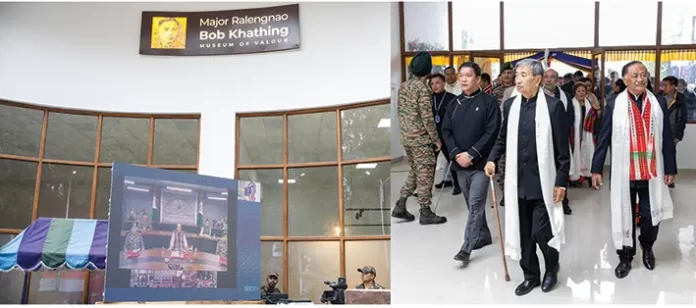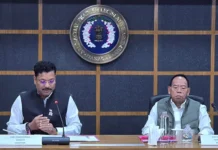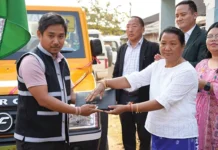
Staff Reporter
ITANAGAR, 1 Nov: Defence Minister Rajnath Singh on Thursday unveiled a statue of Sardar Vallabhbhai Patel and inaugurated the Major Ralengnao ‘Bob’ Khathing Museum of Valour at Tawang.
Singh, who could not travel to Tawang due to inclement weather, virtually inaugurated the statue of Patel and museum from Tezpur in Assam, a Defence spokesperson said.
The museum’s foundation stone was laid by then Governor B.D Mishra, in the presence of Chief Minister Pema Khandu, Chief Minister of Meghalaya Conrad K. Sangma, Union Minister Kiren Rijiju and then Chief of Defence Staff General Bipin Rawat on 14 February 2021. The museum, located near Tawang War Memorial, is curated by RGU assistant professor Moji Riba.
The Defence minister recognised Major Khathing’s crucial role in establishing Indian administration up to McMahon Line in February 1951, highlighting Tawang’s strategic significance.
“Major Khathing not only led the peaceful integration of Tawang into India but also established essential military and security frameworks, including the Sashastra Seema Bal, Nagaland Armed Police, and the Naga Regiment. The ‘Museum of Valour’ now stands as a tribute to his bravery and foresight, inspiring generations to come,” he said.
Singh commended the Indian Army and local communities for their initiative in creating the museum, which will celebrate Major Khathing’s contributions and serve as a symbol of national unity.
Singh paid glowing tributes to Sardar Patel, acknowledging his instrumental role in unifying over 560 princely states post-independence, a feat that stands as a testament to his indomitable resolve and commitment to a unified India.
“This statue ‘Desh Ka Vallabh’ will inspire people reminding them of the strength in unity and the unwavering spirit required to build a nation as diverse as ours,” he said.
The Defence minister underscored the significance of unity and harmony, and the North-East’s unique role in the nation’s identity. He reiterated Prime Minister Narendra Modi’s vision of ensuring economic and infrastructure development of the entire region.
“Holistic development of the nation is possible only when the North East prospers. We will create such a North East which is strong and prosperous not only naturally and culturally but also economically,” he added.
Singh also highlighted the crucial role of Border Roads Organisation (BRO) in the progress of the region. He made special mention of the Sela tunnel linking Assam and Tawang, a project which enhances connectivity across Northeast regions.
“In the times to come, the Arunachal Frontier Highway project will play a major role in connecting the entire North East region, especially the border areas. This 2,000-km long highway will prove to be an important strategic and economic asset for the region as well as the entire nation,” he said.
Singh further commended the Armed Forces’ engagement in the region, from NCC initiatives and local economic support to crucial disaster relief efforts.
“Armed Forces not only provide security but also become a medium for development in that region by cooperating with the people of the border areas. This further strengthens India’s commitment to ensuring development, peace and security in the Northeast,” he said.
The Defence Minister said the disengagement process in certain areas along LAC was ‘almost complete’ based on consensus achieved between India and China. Singh referred to the broad consensus achieved by India and China to restore the ground situation in certain areas along the LAC.
“India and China have been holding talks at both diplomatic and military levels to resolve the differences in some areas along the LAC. As a result of the talks, a broad consensus was developed on the basis of equal and mutual security. The consensus includes the rights of patrolling and grazing in traditional areas,” he said.
“Based on this consensus, the process of disengagement is almost complete. Our efforts will be to take the matter beyond disengagement; but for that, we will have to wait a little longer,” he added.
Governor K.T Parnaik, who also attended the programme, said that Arunachal Pradesh was always a part of India and will continue to be so because of Sardar Patel and Major Bob Khathing. He said that both these great sons of India contributed to the unity and territorial integrity of India.
Parnaik said that Major Khathing’s contributions are pivotal in the history of north-eastern India.
The museum will help preserve this heritage by documenting his life, achievements and the socio-political impact he had on the region, he said.
“The museum will provide young people with insights into leadership, service and patriotism through Major Khathing’s story. It will inspire them to contribute positively to society and embody values essential for nation-building,” he said.
Chief Minister Pema Khandu expressed his happiness over the inauguration of the museum.
“Major Bob Khathing’s expedition was carried out based on the principle of MacMohan Line of the 1914 Shimla agreement. Tawang is the last gift to the nation by Sardar Patel,” Khandu said.
“The history has been unkind to our unsung hero, who brought Tawang under Indian administrative and building a museum is best tribute to Major Bob Khathing,” he said.
Khandu lauded the Indian Army for contributing the site for the museum.
Manipur Chief Minister N. Biren Singh called Major Bob Khathing as a great soul.
“Major Bob Khathing was not only administrator or army man, he was a visionary leader. His sacrifice and contribution for the nation should be respected and saluted,” the Manipur Chief Minister said.
John S.R Khathing, a retired IRS officer and eldest son of Major Bob Khathing acknowledged the role of Chief Minister Pema Khandu and his government in the construction of the museum.
“It would be most inappropriate and dishonorable on my part if I fail to acknowledge and appreciate the role of the Govt of Arunachal Pradesh in honoring Maj Ralengnao Bob Khathing by building and dedicating the Museum in his memory,” Khathing said.
“I also acknowledge the Monpas, who were supportive to my father when he took over Tawang. They were fully confident that this officer of India had their best interest and welfare at heart, and that their future would be far better from the earlier days when they had to follow the dictates of the Tibetan authorities who were then controlling them,” he added.
Union Minister Kiren Rijiju while acknowledging the contribution of Major Khathing said: “Had it not been two great souls (Sardar Patel and Major Bob Khathing), the beautiful Tawang would have been part of China today.” Major Khathing was from a Naga tribe from Manipur and carried out expedition to the remote Tawang in 1951 and hoisted Indian flag on 14 February, 1951 that paved the way for its integration with the rest of India without firing a single bullet.
Later, Major Khathing became Indian Ambassador to Myanmar from 1972 to 1975. He was decorated with Military Cross (MC), Member of the Most Excellent Order of the British Empire (MBE), and later with Padma Shri in 1957. Khathing became the chief secretary of Nagaland in 1967. (With inputs from PTI/Raj Bhavan)


